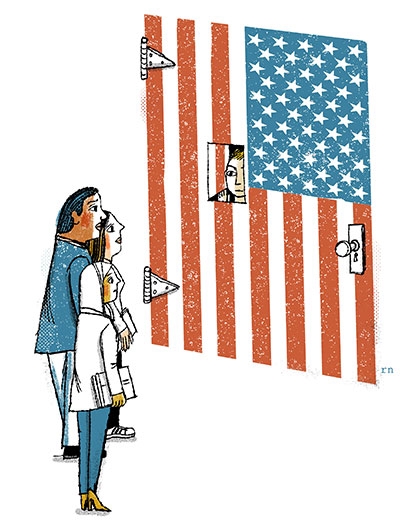Faculty Advice: The Immigration Debate
| by Jason Warburg

The Middlebury Institute is known for the international character of its campus community, with students from other countries typically composing about a third of the student body. How has the national debate over immigration policy in the United States affected the conversations you are having with your students, both inside and outside the classroom?
In translation and interpretation, we work with texts on major global issues of today and tomorrow. Migration has become one of those themes, always tangled up with immigration policy. For MIIS students, the consequences of immigration policy can be intensely personal, determining whether or not they can even study here, and dictating where they can and can’t work and live upon graduating. With the uncertainties swirling around U.S. immigration policy, these conversations have become increasingly poignant, illustrating that politics and policy are ultimately always personal. – Julie Johnson MATI ’89, Associate Professor of Translation and Interpretation
The immigration debate has provided an opportunity to discuss an important characteristic of the American people that heretofore would only salt conversations. Now it can dominate them. Until now, when immigration arose, it was a glancing point of pride—America, a land of immigrants. Now cynicism has crept in among both American and foreign students. Beyond frustration about visas and job prospects, the conversation seems a weird mix of passion and fragility. Sensitivities have been heightened, like nerves rubbed raw. – Robert Rogowsky, Professor and Program Co-chair, International Trade and Economic Diplomacy
I’ve been revealing more about my own identity to my students and colleagues in the Teaching English to Speakers of Other Languages/Teaching Foreign Language program as one who could be targeted and become a potential victim of a policy change. The debate is personally very sensitive to me as I’m an immigrant and used to frequently cross the border in order to renew my short-term visa status. Each time was a rather anxious moment. This is an issue that concerns all of us, not just “others.” — Heekyeong Lee, Associate Professor of Applied Linguistics
Immigration has become a hot topic in my Spanish courses as coverage in the Spanish-speaking media has focused attention on U.S. immigration policy, including DACA and the family-sponsoring visa programs. These topics have made their presence felt across different language levels in my courses, and led to reflection and sharing of ideas in and outside my classes. Speaking amongst ourselves is not only liberating, but also helps to dispel the statements from our current administration. – Pablo Oliva, Associate Professor and Coordinator of Hispanic Studies in the Language Studies Department
The immigration issue has affected the Nonproliferation and Terrorism Studies program in two specific ways. First, there is considerable debate, including amongst program faculty and students, about whether the administration’s ban on visitors from several Muslim-majority countries is actually helpful in countering terrorism. Second, we are seeing fewer student applicants from certain regions where terrorism is a major concern, which might reflect a perception that students from these countries either will not be able to get visas or will not be welcome in the United States. – Jeff Knopf, Professor and Program Chair, Nonproliferation and Terrorism Studies
The debate over immigration policies in the U.S. has affected many of our students and created a fear of the unknown. Not surprisingly, our students show a sincere desire for global social change and are keen to make our campus more inclusive and equitable, to cherish the multiplicity of identities here, and to lead by example. We realize we must know ourselves to help others, so we explore our own biases, values, and ethics to understand the politics of identity. My mantra: less arrogance, more humility, and lots of courage. – Pushpa Iyer, Associate Professor and Director of the Center for Conflict Studies
